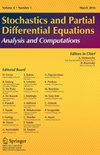具有不可限时系数的完全退化二阶演化方程的加权 $$L_q(L_p)$$ 理论
IF 1.4
3区 数学
Q2 MATHEMATICS, APPLIED
Stochastics and Partial Differential Equations-Analysis and Computations
Pub Date : 2024-04-29
DOI:10.1007/s40072-024-00330-3
引用次数: 0
摘要
我们研究的是完全退化的二阶演化方程 $$\begin{aligned} u_t=a^{ij}(t)u_{x^ix^j}+b^i(t) u_{x^i}+ c(t)u+f, \quad t>0, x\in \mathbb {R}^d \end{aligned}$$(0.1)given with the zero initial data.这里\(a^{ij}(t)\)、\(b^i(t)\)、c(t)仅仅是局部可积分函数,而\((a^{ij}(t))_{d \times d}\)是一个非负对称矩阵,其最小特征值是\(\delta (t)\ge 0\)。我们证明存在一个正常数 N,使得 $$\begin{aligned}&\int _0^{T}\left( \int _{\mathbb {R}^d}|u(t,x)|+|u_{xx}(t,x) |\right) ^{p} dx \right) ^{q/p} e^{-qint _0^t c(s)ds} w(\alpha (t))\nonumber \&\le N \int _0^{T}\int _{\mathbb {R}^d}\f\left( t,x\right) \right| ^{p} dx \right) ^{q/p} e^{-q\int _0^t c(s)ds} w(\alpha (t)) (\delta (t))^{1-q} dt, \end{aligned}$(0.2)where \(p,q \in (1,\infty )\), \(\alpha (t)=\int _0^t \delta (s)ds\), and w is Muckenhoupt's weight.本文章由计算机程序翻译,如有差异,请以英文原文为准。
A weighted $$L_q(L_p)$$ -theory for fully degenerate second-order evolution equations with unbounded time-measurable coefficients
We study the fully degenerate second-order evolution equation
$$\begin{aligned} u_t=a^{ij}(t)u_{x^ix^j} +b^i(t) u_{x^i} + c(t)u+f, \quad t>0, x\in \mathbb {R}^d \end{aligned}$$(0.1)given with the zero initial data. Here \(a^{ij}(t)\), \(b^i(t)\), c(t) are merely locally integrable functions, and \((a^{ij}(t))_{d \times d}\) is a nonnegative symmetric matrix with the smallest eigenvalue \(\delta (t)\ge 0\). We show that there is a positive constant N such that
$$\begin{aligned}&\int _0^{T} \left( \int _{\mathbb {R}^d} \left( |u(t,x)|+|u_{xx}(t,x) |\right) ^{p} dx \right) ^{q/p} e^{-q\int _0^t c(s)ds} w(\alpha (t)) \delta (t) dt \nonumber \\&\le N \int _0^{T} \left( \int _{\mathbb {R}^d} \left| f\left( t,x\right) \right| ^{p} dx \right) ^{q/p} e^{-q\int _0^t c(s)ds} w(\alpha (t)) (\delta (t))^{1-q} dt, \end{aligned}$$(0.2)where \(p,q \in (1,\infty )\), \(\alpha (t)=\int _0^t \delta (s)ds\), and w is Muckenhoupt’s weight.
求助全文
通过发布文献求助,成功后即可免费获取论文全文。
去求助
来源期刊

Stochastics and Partial Differential Equations-Analysis and Computations
Mathematics-Modeling and Simulation
CiteScore
2.70
自引率
13.30%
发文量
54
期刊介绍:
Stochastics and Partial Differential Equations: Analysis and Computations publishes the highest quality articles presenting significantly new and important developments in the SPDE theory and applications. SPDE is an active interdisciplinary area at the crossroads of stochastic anaylsis, partial differential equations and scientific computing. Statistical physics, fluid dynamics, financial modeling, nonlinear filtering, super-processes, continuum physics and, recently, uncertainty quantification are important contributors to and major users of the theory and practice of SPDEs. The journal is promoting synergetic activities between the SPDE theory, applications, and related large scale computations. The journal also welcomes high quality articles in fields strongly connected to SPDE such as stochastic differential equations in infinite-dimensional state spaces or probabilistic approaches to solving deterministic PDEs.
 求助内容:
求助内容: 应助结果提醒方式:
应助结果提醒方式:


